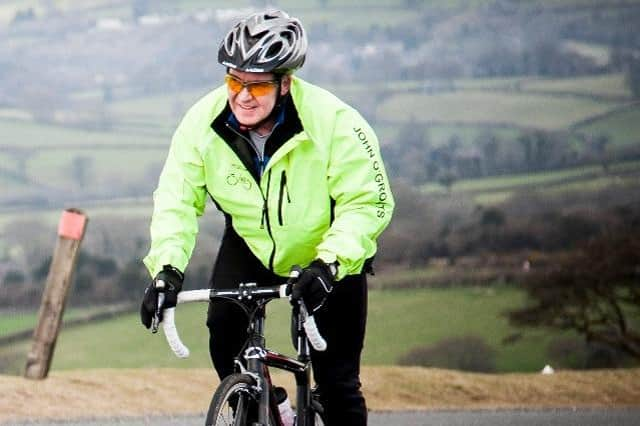Column: In my view - Future generations are depending on us


I'm writing this column on Tuesday afternoon (July 19) with the temperature in Calderdale hitting 38 degrees centigrade. I'm now working from home having taken the decision to close the office in Halifax after an uncomfortable morning with all windows open and fans going.
I have experienced hotter temperatures in Africa when I was growing up and more recently in Greece, but this heat feels different, and I guess when abroad I was able to seek sanctuary in a swimming pool, the sea or a cool room thanks to accommodation purpose built for the hot climate. In the UK our homes, offices and schools are not geared up for coping with these extreme temperatures.
Advertisement
Hide AdAdvertisement
Hide AdIn the same way we have had to rethink how we become more resilient to flooding, another biproduct of climate change, we may have to think again about how we live, learn and work in the future given the year-by-year increase in the global temperature.
The record-breaking heat we are experiencing is the clearest indication yet that we are in the middle of an unfolding disaster, so I make no apology for writing about a subject I have covered at least once before in this column.
I believe strongly that human beings are inherently kind, and this belief has been born out when local disasters have happened with floods in the Upper and Lower Calder Valleys, the recent school fire at Ash Green School, or further afield with the Ukraine war. Many of us have reacted in positive ways providing practical support and donations to help those affected.
The difference with the unfolding climate emergency is that it's a disaster that affects us ALL. Here and now! And it feels overwhelming. There's a sense that whatever I do as an individual or as a community won't make a jot of difference. But we can't think this way otherwise our children and our children's children will be the ones who suffer when we could have done something about it in our lifetime.
Advertisement
Hide AdAdvertisement
Hide AdI recently heard from my friends in northern Kenya, and they told me they have gone 18 months with no rain and their goats, their only valuable assets, have perished. It left me feeling totally helpless - nothing I could say or do would make the weather change for them or replace their goats. One way I can help them indirectly is doing my bit to reduce my carbon footprint and if we all do the same Kennedy and Mparni in Kenya may feel the benefit.
Climate emergency is here folks, and we are now feeling its affects in beautiful Calderdale with scorching temperatures, and we can do practical things that can make a tangible difference. From what the climate experts say there's still time to turn things around, but we all need to act now. Without getting too political it needs to start at the top with Governments and politicians globally providing clear policies and incentives to significantly reduce carbon dioxide and other greenhouse gases getting into the atmosphere.
Locally we can also make a positive difference and together strive for a zero carbon Calderdale. The Community Foundation for Calderdale (CFFC) I work for, and Calderdale Council have combined funding of over £1m to support local greener transport, building adaptations and education projects to achieve this end.
You can read about the great eco-friendly strides that are being made by Calderdale Council and its partners at https://www.calderdale.gov.uk/v2/council/our-vision/climate-emergenc and find out about the Climate Emergency Fund managed by CFFC at https://cffc.co.uk/climate-emergency-carbon-zero-fund/.
Advertisement
Hide AdAdvertisement
Hide AdOne easy thing we can all do is sign up to the Calderdale Food Charter and pledge to take action to grow a healthy sustainable food culture in Calderdale. I am lucky I have some spare land to grow vegetables, but you don't need a lot of space to start growing your own food - once you've tried it gets quite addictive!
This weekend I harvested two varieties of onions, potatoes, beetroot and redcurrants and it's the best feeling in the world growing and eating the fruits of my labour, and dishing out surplus veggies to neighbours, family and work colleagues. Growing my own food reduces the need to shop as much and the food I grow has nil food miles - my contribution to helping the climate.
I imagine when you're reading this column the July weather has returned to a more normal temperature. We mustn't ignore the record-breaking temperatures of last week and we have to act now. Here are 10 easy things we can do to reduce our carbon footprint, why not challenge yourself to do as many of them as possible:
Go dairy free for one day a week
Walk to work one day a week
Shop local
Go a week without eating meat
Grow a tree in your garden
Stop buying bottled water
Turn off lights and devices when not using them
Use cold water cycle for washing your clothes
Drive efficiently
Keep items out of landfill
You can make a donation to our local Climate Emergency Appeal at www.cffc.co.uk (donate) and/or why not join thousands of others on August 4 for the national Cycle to Workday https://www.cyclescheme.co.uk/cycletoworkday.
Advertisement
Hide AdAdvertisement
Hide AdAll the above isn't just 'food for thought' it is not just happening in Africa or other parts of the world it is happening on our doorstep. Future generations are depending on us to do the right thing. Will the crazy temperatures that saw devastating fires and so much chaos be the catalyst we need to change how we live, work and play - I guess only time will tell?